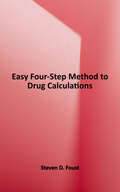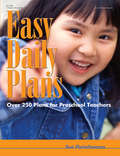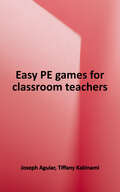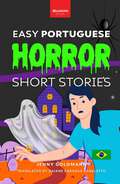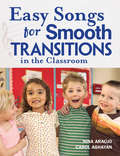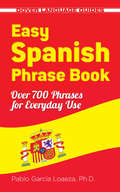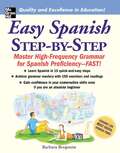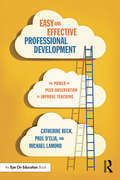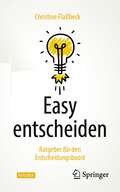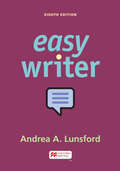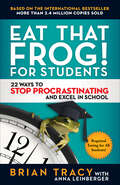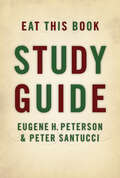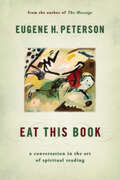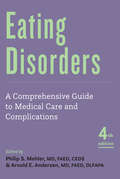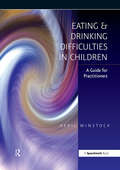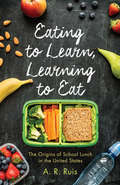- Table View
- List View
Easy 4-Step Method to Drug Calculations
by S. D. FoustThis unique work-text has been class-tested by hundreds of students. It makes the difficult concept of drug dosage calculations easy to understand and master by using a simple four-step method that focuses only on the information necessary for learning this skill. The readers are guided through every step of the calculation process with easy-to-understand and follow explanations. This is the perfect resource for paramedics, nurses, students and any other health care professionals who administer medication. Features Include: *Straightforward and easy to read *Hundreds of practice problems that incorporate realistic patient scenarios, protocols, and the latest trends in treatment management. *Final review section *Worked out-answer section clearly shows students every step of the problem-solving process.
Easy Computing for the Over 50s: Flash
by Bob ReevesAre you a late beginner but want to get the best out of your computer? Get a kick-start with this little book which will give you just enough to get you going...
Easy Daily Plans: Over 250 Plans for Preschool Teachers
by Sue FleischmannEasy Daily Plans has everything a teacher needs for a complete year's worth of daily plans! Organized by month, this great grab-and-use curriculum has over 250 daily plans that teachers can use to plan fun and enriching activities for young children. The beginning of each chapter lists month-long celebrations, week-long celebrations, holidays, and significant dates to help with planning. Each individual lesson plan is complete with: An opening group-time activity Story time book suggestions Activities for a variety of centers, including Art Blocks Dramatic play Music Fine motor Science Math Extension activities, such as small group activities, games, outdoor activities, snack suggestions, and additional center activities Add energy and excitement to the classroom using the unique ideas in Easy Daily Plans.
Easy Electronics
by Charles PlattThis is the simplest, quickest, least technical, most affordable introduction to basic electronics. No tools are necessary--not even a screwdriver. Easy Electronics should satisfy anyone who has felt frustrated by entry-level books that are not as clear and simple as they are supposed to be.Brilliantly clear graphics will take you step by step through 12 basic projects, none of which should take more than half an hour. Using alligator clips to connect components, you see and hear immediateresults. The hands-on approach is fun and intriguing, especially for family members exploring the projects together.The 12 experiments will introduce you to switches, resistors, capacitors, transistors, phototransistors, LEDs, audio transducers, and a silicon chip. You'll even learn how to read schematics by comparing them with the circuits that you build.No prior knowledge is required, and no math is involved. You learn by seeing, hearing, and touching. By the end of Experiment 12, you may be eager to move on to a more detailed book. Easy Electronics will function perfectly as a prequel to the same author's bestseller, Make: Electronics.All the components listed in the book are inexpensive and readily available from online sellers. A very affordable kit has been developed in conjunction with the book to eliminate the chore of shopping for separate parts. A QR code inside the book will take you to the vendor's web site.Concepts include:Transistor as a switch or an amplifierPhototransistor to function as an alarmCapacitor to store and release electricityTransducer to create sounds from a timerResistor codesA miniature light bulb to display voltageThe inner workings of a switchUsing batteries and resistors in series and parallelCreating sounds by the pressure of your fingerMaking a matchbox that beeps when you touch itAnd more. Grab your copy and start experimenting!
Easy Grammar Grade 6 Student Workbook
by Wanda C. PhillipsEasy Grammar: Grade 6 Student Workbook may not be reproduced. Permission is not granted for district-wide, school-wide, or system-wide use. Reproduction for any commercial use is strictly forbidden.
Easy Internet & Email for the Over 50s: Flash
by Bob ReevesThe books in this bite-sized new series contain no complicated techniques or tricky materials, making them ideal for the busy, the time-pressured or the merely curious. Based on Windows 7 Easy Internet & Email for the Over 50s is a short, simple and to-the-point guide to getting what you want out of the Internet and your Email. In just 96 pages, the reader will discover how to deal with everything from sending an email and shopping online to online dating!
Easy Internet & Email for the Over 50s: Flash
by Bob ReevesThe books in this bite-sized new series contain no complicated techniques or tricky materials, making them ideal for the busy, the time-pressured or the merely curious. Based on Windows 7 Easy Internet & Email for the Over 50s is a short, simple and to-the-point guide to getting what you want out of the Internet and your Email. In just 96 pages, the reader will discover how to deal with everything from sending an email and shopping online to online dating!
Easy Money
by Joel GibsonDiscover bill-buster Joel Gibson&’s simple money-saving system for a post-COVID world where everything is more expensive! Australian households have survived a once-in-a-century pandemic and the toughest cost of living crisis in a generation. But most of us are still paying businesses and governments hundreds or thousands more than we have to. Get some of that money back, with minimal effort, and it could be the easiest $1000+ you&’ve ever earned. Some of Joel&’s tips include: • Crucial updates on the EASIEST ways to slash energy, telco, insurance and housing costs • Simple NEW money-saving hacks for getting a better deal on groceries and petrol • How to save HUNDREDS on streaming and pay TV • How to see if you own a share of the BILLIONS in &‘free money&’ held by governments and banks Originally published as Kill Bills!, this updated and expanded edition might just make you feel good about money.
Easy PE Games for Classroom Teachers: Simple games that get kids active and teach a life lesson
by Joseph AguiarThis book will provide you with 20 simple activities that require little to no equipment. No sports background is required. A safe space and a little time are all you need to plan a great PE lesson that your kids will love. Each lesson comes with a skill focus, simple description, variation, and teaching point. The teaching points are a great way to wrap up the lesson. Developing our students cognitively, emotionally, and physically is the goal of any teacher.
Easy Portuguese Horror Short Stories: Learn Portuguese the Spooky Way!
by Jenny Goldmann"Aprenda Português do Jeito Assustador!" Você se atreve a percorrer as trilhas assombradas do ensino de Português? Nestas páginas, há uma coleção de 9 histórias de terror fáceis em Português, cada uma criada para entreter e educar. Junte-se a guias fantasmagóricos e enfrente provações de outro mundo enquanto aprimora seu vocabulário, compreensão e habilidades de conversação. Projetadas especificamente para alunos de Português no nível A2-B1/2, essas histórias assustadoras oferecem mais do que apenas sustos. Testes, glossários e perguntas para discussão esperam por você, tornando essa jornada rumo ao desconhecido tão emocionante quanto gratificante. •9 Histórias envolventes: explore diversos temas de terror em contos criados para intrigar e desafiar, mas adequados para todas as idades. •Aprenda em seu nível: escrito para alunos A2-B1/2, garantindo vocabulário e gramática acessíveis. As histórias aumentam em dificuldade, o que significa que os alunos podem ter uma noção do avanço até o final do livro. •Ferramentas educacionais: glossários, questionários de múltipla escolha e perguntas para discussão apoiam a compreensão e incentivam as conversas. Seja você um professor de idiomas em busca de material novo ou um autodidata em busca de uma forma aventureira de aprimorar suas habilidades em Português, “Easy Portuguese Horror Stories” oferece uma experiência emocionante e educativa. Adquira seu exemplar hoje mesmo e desvende os mistérios da língua Portuguesa - se tiver coragem!
Easy Songs for Smooth Transitions in the Classroom
by Carol Aghayan Nina AraújoSing your way through difficult times of the day and watch your job get easier!Young children in school go through many transitions throughout the day. What can make ten children settle down, clean up, and move from room to room without protest?Even if you're uncomfortable singing in public, the simple songs in this book will help you glide smoothly through tough transitions such as greetings and good-byes, calling attention, cleaning up, moving, waiting, and slowing down. Children will feel more powerful and in control, reducing stress levels during the more difficult times in your day. You will learn songs that everyone will love singing, including:"Get On Board, Little Children" and "We're On Our Way," which move toe-tapping children in and out of the classroom"Go to Sleep, My Little Pumpkins," which helps kids wind down for naptime"Cleaning Spirit," which acknowledges children as they clean up the classroomMultiple songs for each transition area, a transition planning guide, and lyrics to all 69 songs-formatted so you can easily create your own song cards-are included.
Easy Spanish Phrase Book NEW EDITION: Over 700 Phrases for Everyday Use (Dover Language Guides Spanish)
by Dr Pablo Garcia LoaezaDesigned as a quick reference tool and an easy-to-use study guide, this inexpensive and up-to-date book offers fast, effective communications. The perfect companion for tourists and business travelers in Spain and Latin America, it features words, phrases, and sentences that cover everything from asking directions to ordering dinner.Over 700 conveniently organized expressions include terms for modern telecommunications as well as phrases related to transportation, shopping, medical and emergency situations, and other common circumstances. A phonetic pronunciation accompanies each phrase.
Easy Spanish Step-by-Step
by Barbara BregsteinEasy Spanish Step by Step proves that a solid grounding in grammar basics is the key to mastering a second language. Grammatical rules and concepts are clearly explained in order of importance, and more than 300 verbs and key terms are introduced on the basis of frequency. Numerous exercises and engaging readings help learners quickly build their Spanish speaking and comprehension prowess.
Easy and Effective Professional Development: The Power of Peer Observation to Improve Teaching
by Catherine Beck Paul D'Elia Michael W. LamondGiven the current economic climate and budget constraints facing schools, funding for professional development is continually reduced. And yet administrators still need to find methods to implement new instructional initiatives, such as the Common Core State Standards. This important book provides leaders with a high quality professional development approach at a low cost—the Peer Observation Process. Outlined in manageable steps, this strategy will help leaders implement any new school initiative or instructional method, no matter the context. This book will help you: -Support staff with job-embedded learning that includes reflection and feedback -Get your staff excited and engage them in ongoing collaboration -Create teams and organize schedules -Initiate and deliver tough conversations -Address accountability and measure success Based on an established and successful program, this book outlines an effective approach that is easy to implement and will help schools increase student achievement, strengthen school culture, and improve job satisfaction.
Easy entscheiden: Ratgeber für den Entscheidungsboost
by Christine FlaßbeckMit Easy Entscheiden treffen Sie noch vor dem Lesen Ihre beste Entscheidung! Lassen Sie Ängste, Grübeleien und Unsicherheit hinter sich. Treffen Sie ab jetzt Ihre Entscheidungen mit Überzeugung! In diesem Buch wird Ihnen auf leicht verständliche Weise beschrieben, wie vielfältig Sie entscheiden können und wie ein entspannter Umgang mit dem Thema gelingt. Dr. Flaßbeck gibt Ihnen dazu mit Fachwissen und Praxiserfahrung die nötigen Werkzeuge an die Hand, mit denen Sie direkt durchstarten können. Die Autorin hat sich für das Schreiben dieses Buchs entschieden – jetzt müssen nur noch Sie entscheiden, es zu lesen und mehr Klarheit für Ihr ganzes Leben zu gewinnen! Zielgruppen: Dieser Ratgeber ist vor allem für diejenigen, die ihre eigene Entscheidungsfindung verbessern wollen. Weiterhin bietet das Werk denjenigen eine Fülle an Anregungen, die täglich andere in ihren Entscheidungen unterstützen: sei es als Coach oder Trainer_in, Assistenz, Führungskraft, Teamkolleg_in oder von Mensch zu Mensch. Zur Autorin: Dr. Christine Flaßbeck ist Dozentin der Psychologie und selbstständig als Personal- und Organisationsentwicklerin. In Coachings und Trainings hilft sie Menschen u.a. dabei, sich gut und gerne zu entscheiden.
EasyWriter
by Andrea A. LunsfordEasyWriter gives friendly, reliable writing help in formats that are easy to use and easy to afford. What’s more, this little book offers big ideas from Andrea Lunsford: that reading critically and writing well empower us, that language helps writers face challenges and meet opportunities, and that engaging with others and in our own learning is transformative. Inspiring and trusted advice plus powerful digital tools means the choice is Easy.
Eat That Frog! for Students: 22 Ways to Stop Procrastinating and Excel in School
by Brian Tracy Anna LeinbergerAdapted from the bestseller that &“firmly gets to the root cause of why people procrastinate [and] effortlessly explains how to boost your productivity&” (Micro Business Hub). Students of all ages can struggle with how to manage their time. Encountering the necessity of time management for the first time, high schoolers juggle classes, extracurricular activities, jobs, internships, family responsibilities, and more. College brings more freedom and less structure—making time management even more critical. Brian Tracy&’s Eat That Frog! has helped millions around the world get more done in less time. Now this life-changing global bestseller has been adapted to the specific needs of students. Tracy offers tips, tools, and techniques for structuring time, setting goals, staying on task (even when you&’re not interested), dealing with stress, and developing the skills to achieve far more than you ever thought possible!
Eat This Book Study Guide
by Eugene Peterson Peter SantucciThe second part of Peterson's momentous five-volume work on spiritual theology, Eat This Book challenges us to read the Scriptures on their own terms, as God's revelation, and to live them as we read them. With warmth and wisdom Peterson offers greatly needed, down-to-earth counsel on spiritual reading through a fascinating conversation on the nature of language, the ancient practice of lectio divina, and the role of Scripture translations. What better way to continue that conversation than through an intensive study with other readers? This helpful study guide is designed to enable small groups in schools or churches -- or even individuals -- to delve deeper into the timely wisdom of Eat This Book. Peterson's discussion is here broken up into nine "sessions," each of which contains a summary, quotations to consider, questions for interaction, and a suggested activity, ending with a suggestion for prayer.
Eat This Book: A Conversation in the Art of Spiritual Reading
by Eugene H. PetersonEat This Book challenges us to read the Scriptures on their own terms, as God’s revelation, and to live them as we read them. With warmth and wisdom Peterson offers greatly needed, down-to-earth counsel on spiritual reading. In these pages he draws readers into a fascinating conversation on the nature of language, the ancient practice of lectio divina, and the role of Scripture translations; included here is the “inside story” behind Peterson’s own popular Bible translation, The Message.
Eat!
by Steven KrollHarry's decision to become a vegetarian causes some problems for him in his third-grade class.
Eating Disorders: A Comprehensive Guide to Medical Care and Complications
by Philip S. Mehler, MD, FAED, CEDS and Arnold E. Andersen, MD, FAED, DLFAPAA comprehensive guide on how to diagnose, treat, and care for those with eating disorders.Eating disorders, which include such conditions as anorexia, bulimia, binge eating, and pica, represent a challenge to both patients and health care providers alike. For more than 20 years, health care providers have turned to the expert advice found in Eating Disorders to keep up to date with the latest research in the field and to help them provide the best care available for their patients. In this new, thoroughly revised and expanded edition of their best-selling work, Drs. Philip S. Mehler and Arnold E. Andersen provide a user-friendly and comprehensive guide to treating and managing eating disorders for primary care physicians, mental health professionals, worried family members and friends, and nonmedical professionals (such as teachers and coaches). Mehler and Andersen • identify common medical complications faced by people who have eating disorders• answer questions about how to treat both physical and behavioral aspects of eating disorders• discuss serious complications, including cardiac arrhythmia, electrolyte abnormalities, and gastrointestinal problems• incorporate all-new information on avoidant restrictive food intake disorder (ARFID), binge eating disorder, and the role of social media in promoting disordered eating• offer targeted advice for working with specialists• include four new chapters on eating disorders in children and adolescents; atypical anorexia; eating disorders in transgender individuals; and family therapy• feature engaging clinical vignettes • answer a list of common questions practitioners may have in each chapterThe most comprehensive work on the market and the only book that covers eating disorders in transgender individuals, Eating Disorders is a compassionate, evidence-based, and essential guide.Contributors: Arnold E. Andersen, Ovidio Bermudez, Jeana Cost, Meghan Foley, Dennis Gibson, Neville Golden, Sacha Gorell, Jeffrey Hollis, Mori J. Krantz, Daniel Le Grange, Russell Marx, Jennifer McBride, Philip S. Mehler, Leah Puckett, Katherine Sachs, Michael Spaulding-Barclay, Anna Tanner, Nathalia Trees, Jessica Tse, Kenneth Weiner, Patricia Westmoreland
Eating Enchiladas
by Phyllis Reynolds NaylorA sleepover inspires Sarah, who likes to do things differently, to choose Mexico for her "Countries of the World" presentation.
Eating and Drinking Difficulties in Children: A Guide for Practitioners
by April WinstockClearly illustrated, this is the ultimate practical handbook for all professionals working with children with eating and drinking difficulties, and an essential guide for all students studying this area of therapy. Covering the complex issues involved in the field of eating and drinking difficulties in children, this text: examines the theoretical background while maintaining a clear focus on its practical application; provides essential information on all the relevant issues; contains an invaluable range of photocopiable material for each chapter, which can be given to families and professional colleagues; provides a range of appendices with details of useful resources including a reference list and suppliers of equipment. April Winstock is a Speech & Language Therapist who is registered with the Health Professionals Council and has worked at the Bobath Centre, London, special schools and hospitals. She has been running courses on eating & drinking difficulties in children for many years. April currently has her own practice in which she sees children with a range of communication and eating problems.
Eating to Learn, Learning to Eat: The Origins of School Lunch in the United States
by Andrew R. RuisIn Eating to Learn, Learning to Eat, historian A. R. Ruis explores the origins of American school meal initiatives to explain why it was (and, to some extent, has continued to be) so difficult to establish meal programs that satisfy the often competing interests of children, parents, schools, health authorities, politicians, and the food industry. Through careful studies of several key contexts and detailed analysis of the policies and politics that governed the creation of school meal programs, Ruis demonstrates how the early history of school meal program development helps us understand contemporary debates over changes to school lunch policies.
